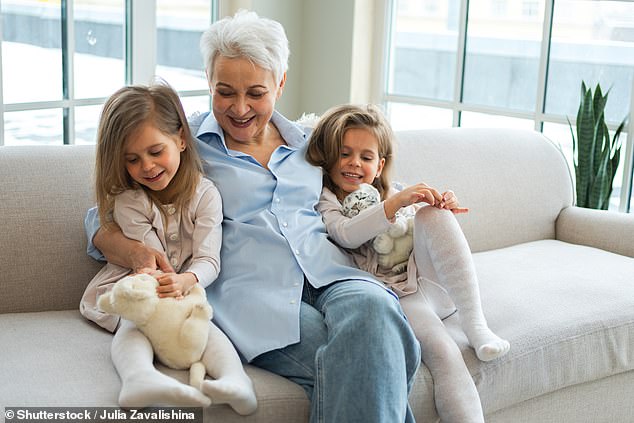We're gifting £100,000 to our grandkids from a joint account - what if my wife or I die within seven years?
- Have a financial planning question? Email: [email protected]
My wife and I want to gift money to our two granddaughters to use for either university fees or a house deposit when they are older. They are currently five and two years old.
If we give them each £50,000 from a joint bank account how would the tax on gifting work if one of us dies in the next seven years?
Does the relevant tax apply on the first death or the second, given that the money has come from a joint account?
How can we ensure that they get as much of this money as possible? M.D, via email
SCROLL DOWN TO FIND OUT HOW TO ASK YOUR FINANCIAL PLANNING QUESTION

Passing on your wealth: The seven year rule allows gifts to become tax-free if you live for seven years after making them
Harvey Dorset, of This is Money, replies: Inheritance tax is charged at 40 per cent over the nil rate band of £325,000. This can be double to £650,000 jointly for those who are married or in a civil partnership.
A further allowance, the residence nil rate band, increases the threshold by £175,000 each for those who own a property and leave it to their direct descendants. These creates a potential maximum joint inheritance tax-free total of £1million.
If the whole estate is left to a person's partner upon their death, then it is not liable for inheritance tax and that will then be due on the surviving partners deatj.
If your estate is worth more than the threshold it is understandable that you would like to protect your granddaughters from having to bear some of this by giving them gifts now.
As you rightly mention, if you both live for seven years after making the gift, then this won't be a problem as the money would become tax-free.
In terms of how the tax would be applied on money coming out of your joint account, the answer is simply that the gifts would be divided between you and your wife in the event that one of you dies within seven years, meaning £50,000 from each of your estates.
This means that £50,000 worth of the two gifts would be potentially liable for inheritance tax if one of you died.
However, when calculating inheritance tax, there is a specific order in which the nil rate band is applied. Lifetime gifts made within the seven years before your death are the first component to use up the nil rate band.
This of course means that other parts of your estate will fall outside of the nil rate band in the event of one of you dying.
As mentioned by our experts below, your gifting allowance can mitigate the amount of inheritance tax charged on your estate.
If unused the previous year, one year's allowance can also be rolled over, bringing it to £6,000.
Combined, this reduces the total gifts to £88,000 rather than £100,000. You can also use your £3,000 gifting allowance each year until your death, as well as £250 gifts to any other person on top of this, so giving some money gradually has an advantage but delays starting the clock ticking.
This is Money spoke to two financial advisers to find out how you can pass on as much of this money as possible without feeling the sting of inheritance tax.

Better returns: Richard Allan says investing the money could see it grow by the time the reader's granddaughters access it
Richard Allan, financial planning director at Schroders Personal Wealth, replies: This is a great position to be in and I am sure your two granddaughters will be very grateful.
When you gift money from your joint bank account it generally is deemed that half of the gift is made by each of you.
If one of you dies within seven years of the gift being made it would potentially use up part of your individual nil rate band (NRB) or be subject to Inheritance Tax.
The NRB is a threshold below which the estate does not incur inheritance tax.
Each of us have a NRB of £325,000 on death and tax above this can be 40 per cent.
You would have to be mindful of any other gifts given away before this gift to your granddaughters as this may impact any tax that may be payable.
If the estate of the deceased is above the nil rate band, their share of the gift (£50,000) could be taxed.
If you have made previous gifts and the total value of the gifts is over the £325,000, taper relief may apply. If death occurs between three and seven years, gifts that exceed the nil rate band reduce over time
One of the allowances that you have is the annual gift allowance, which allows both of you to make a gift of £3,000 each year, without being impacted by the seven-year rule and possible 40 per cent tax charge.
The gifts to your granddaughters could be part of the annual gift allowance of the previous year if no gifts were made in that tax year.
As your intention is that the gifts will be used in the future for university fees or a house deposit, it is unlikely that they will need access to the money for well over 10 years.
As this is the case it may be appropriate to take investment risk to reap potentially better rewards, however this is not guaranteed as the value of investments can go down as well as up.
This could be achieved in a managed fund that is diversified into a range of different assets, to spread risk.
Before the child reaches the age when the funds are going to be distributed then risk may need to be reassessed.
You may want to consider doing a combination of tax efficient savings and investments and make use of a Junior Isa for each granddaughter.
The money is held for them until they are 18 and then becomes theirs to decide what to do with.
There is an annual limit of £9,000 so it could take a few years to invest the whole £50,000 each.
These could be used in combination with Premium Bonds. Although Premium Bonds don't have a fixed return, they take part in a monthly draw which if you win can give a tax free average return in line with a savings account and could act as a safe home for the uninvested cash before annual Isa investments are made.
If you have reservations that your granddaughters will have access to the money at age 18 and you want some control when the money is released to them and how they use it in the future, you can consider a trust arrangement to hold an investment such as an investment bond or fund; however trusts are generally more complex than a JISA , or Premium Bonds as there may be tax charges when setting up the trust, during the trust life and when exiting the trust.
Whichever option you consider, it may be appropriate to seek professional advice to help you make the right decision.

Shelley McCarthy says a trust could help to ensure your granddaughter see as much of the money as possible
Shelley McCarthy, financial planner and managing director at Informed Choice, replies: If you were to gift to £50,000 each from a joint bank account, you would first be able to offset your annual gift allowance of £3,000 (assuming that you have not made any other gifts).
If you have not made a gift in the previous tax year you are able to carry forward a further £3,000 each.
This means that the value of each gift could be reduced to £44,000 each from an Inheritance Tax (IHT) point of view.
If you survive seven years, then this would fall outside of your estate for IHT purposes, based on current legislation.
If one of you were to die within seven years, half of the value of the gift would typically fall back inside of estate for IHT.
This would utilise part of your nil rate band of £325,000, again assuming that no other gifts have been made.
So in this example, the nil rate band available to offset against the remainder of the estate would be reduced by £44,000 to £281,000.
If you are fortunate to have income that exceeds your expenditure, then gifts out of income that do not reduce your standard of living can also be inheritance tax free, but such gifts are usually paid on a regular basis so may take some time to build into a decent lump sum.
If you were to die within seven years, there would be no impact from an IHT point of view.
In terms of ensuring that your granddaughters get as much of this money as possible, you can gift an amount into a 'Bare' (or Absolute) Trust and again these payments will constitute a gift (a potentially exempt transfer) that could be subject to inheritance tax if you die within seven years of making the gift.
The money will not be accessible by your granddaughters until they attain age 18 (or get married before that age).
You can appoint yourselves as trustees if you want to be able to control what happens with the money before the granddaughters receive the money.
As your granddaughters are so young, with a long time to go before they need to pay University fees or buy property, you might want to consider investments that have a good chance of capital growth rather than deposit-based savings
You can also both contribute to Junior ISAs for the girls. They are able to have £9,000 per annum invested into junior ISA accounts.
The money in these accounts cannot be accessed until they attain age 18. Only parents or guardians can open such an account, but once open you can pay monies in.
Even though the monies are coming from a joint account the payments will be individual gifts from the two of you.
Do keep records of the gifts and any allowances/exemptions claimed, so that the executors of your estate know about them when administering your estate.


























































